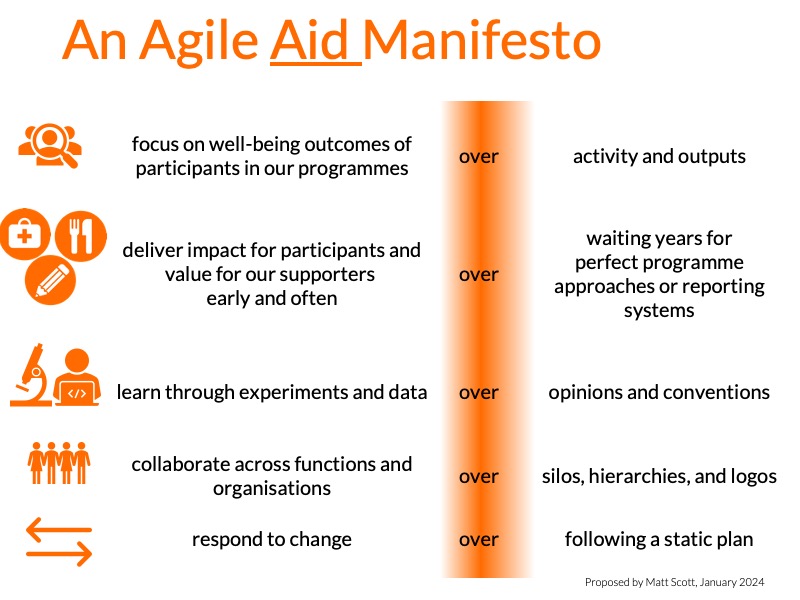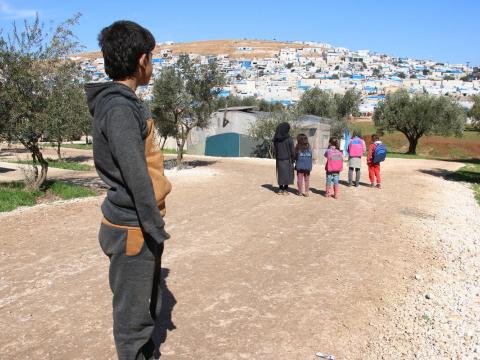
The world of aid needs an agile revolution
Matt Scott calls aid organisations to urgently take a leaf out of the software industry's book and become much more agile
The international aid sector is long overdue for a revolutionary paradigm shift. More accurately, it is overdue for five paradigm shifts. To understand why, it’s helpful to look at the history of the Agile Manifesto.
At a ski resort in Utah in 2001, a group of people from different companies came came up with what they called The Agile Manifesto:
Individuals and interactions over processes and tools
Working software over comprehensive documentation
Customer collaboration over contract negotiation
Responding to change over following a plan
These four values don’t take up much room on the page, but arguably triggered a software development revolution still playing out today. At the time, technology companies had a bad pattern of taking years to produce buggy products that their customers hated.
Today, most of the biggest tech giants succeed because of the Agile values. Personal interaction is the backbone of digital experiences today. The best tech products don’t come with manuals - they just work intuitively because they were designed with customers in mind, and they are upgraded constantly via updates. The entire tech industry pivots successfully and quickly to major changes - like the shift to AI in 2023 triggering nearly $3 trillion of new capital investment.
Technology isn’t the only sector benefiting from Agile. In June 2012, the first version of The Agile Marketing Manifesto emerged, refined again in 2017 to five values (including data-centric experimentation):
Focusing on customer value and business outcomes over activity and outputs
Delivering value early and often over waiting for perfection
Learning through experiments and data over opinions and conventions
Cross-functional collaboration over silos and hierarchies
Responding to change over following a static plan
So how might this apply to the world of international aid? Aid workers are not software engineers. Multi-lateral and non-governmental organisations don’t have customers, nor do they have the big budgets of tech giants. How could software development principles translate into better provision of humanitarian and development assistance to people living in the context of disasters and poverty?
Aid organisations do have two important groups of people who should be valued with at least the same esteem that businesses value their customers:
- people they are trying to help, who participate in the programmes they offer. (In some circles these are called “beneficiaries” or “recipients”, although both these terms have some negative historical connotations.)
- people who are trying to help, who give financially, lobby, or volunteer their time. Sometimes these are called “donors”, “sponsors”, “advocates”, “patrons”, “board members”, or “supporters”.
With these two vital groups of people in mind, the two Agile manifestos above could be made very relevant to the issues and challenges of aid today: an Agile Aid Manifesto.

Why are these values important to aid today?
As a multi-billion-dollar global enterprise, the world of aid has too often measured activity and outputs at the expense of asking whether the people they are trying to help are actually better off, particularly over the long-term. Sustainable human well-being needs to be the goal of aid, not single-year iterative improvements on charts of vaccination rates, reading levels, food security, or purchasing power parity.
Many aid organisations deliver carefully curated annual reports that feature success stories from the previous year of work. Supporters today tell aid organisations they want to know the real and raw story of impact as it happens: the good, the bad, and the struggle.
The world of aid often relies on conventional thinking and persistent paradigms. The world of aid can be much more rigorous with learning from real-time data, and continuously improving processes that deliver meaningful impact to participants.
Despite ample evidence that aid needs to be delivered across the artificially and arbitrarily rigid categories of “humanitarian” and “development”, the world of aid continues – perhaps inadvertently - to reinforce those silos and seeks refuge in hierarchy and organisational defence.
Why now?
Hundreds of millions of people are being affected today by massive changes to our world’s climate, our cities, and our conflicts. Each of these changes alone demand change from the aid industry, but together they represent an existential threat; unless aid organisations change the way we contextualise our work, collaborate with each other, and co-fund and co-program initiatives, we will continue to fail our most important customers: the people most affected by climate, conflict, and poverty; and the people who faithfully support this work. The donors of today and tomorrow expect nothing less, and the people benefiting from aid deserve this kind of agility.
Matt Scott is World Vision International's Director of Resource Development, Fragile Contexts.


